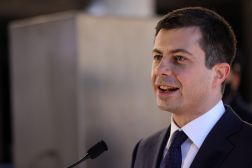U.S. Transportation secretary: Smart cities are next transportation revolution

WASHINGTON, D.C. — The progress cities can make to become smart cities could set off the next revolution in American transportation, U.S. Transportation Secretary Anthony Foxx said.
In opening remarks at the final day of Smart Cities Week, Foxx said the move toward becoming a smarter city echoes the revolutionary nature of the Interstate Highway System when it was established in the 1950s.
“The idea of the interstate system was revolutionary. We’d had roads before, but the idea of connecting the entire country was pretty bold,” Foxx said. “The reason why we think about and talk about smart cities is because we recognize that we don’t have infinite resources, and we want to be smart about how we use those resources.”
As the millennial generation cycles in and the baby boomers cycle out as city residents, planning officials need to be more strategic about how they plan movement within their city boundaries, Foxx said. In addition to that generational shift, cities are also forced to act on rapid transportation technological innovation, like autonomous vehicles.
“When we think about how we’re planning cities, we should be looking at these trends going forward and not be so nostalgic about how we planned 50 years ago,” Foxx said. “Our transportation business models, our funding models, are nostalgic.”
Last week, the Transportation Department released its first autonomous vehicle policy to establish a foundation for the integration of driverless cars into daily life, which Foxx called “the first, most comprehensive policy any nation has ever produced.”
To address the rising technological and citizen demand challenges, Foxx said cities need to turn to the one asset they all have: data.
“What I’m telling you is that nostalgia is not data-based,” Foxx said. “If we want to build a system for our people, we have to believe our data.”
Though Foxx encouraged technology adoption, he echoed the remarks of city and state technology officials at the conference the previous day — smart cities are not about technology.
“Let me tell you what a smart city isn’t,” Foxx said. “Smart cities are not collective of different technologies; smart cities are cities that understand that those technologies are tools that connect to a larger plan for how a city is to develop.”
Cities have the opportunity to become smart from the ground up, Foxx said, and with that opportunity comes the responsibility to ensure that smart cities are inclusive to citizens whether they have access to advanced technology or not. The opportunity, in reality, is to include inclusion from the beginning.
“Define smart cities in a way that is inclusive from the beginning,” Foxx said. “That actually has the purpose to bring us together in ways that we have not been brought together before and allow people no matter where they live the easy convenience that [technology] can bring us.”
Instead, smart city planning needs to not just include city tech officials but rather representatives from leadership, other agencies, the private sector and academia.
“You’re building a new architecture for the world one city a time,” Foxx said. “Don’t get so fascinated with the flash bang pop of technology and just remember that it’s got to be technology that’s relevant to the societies that use it.”





